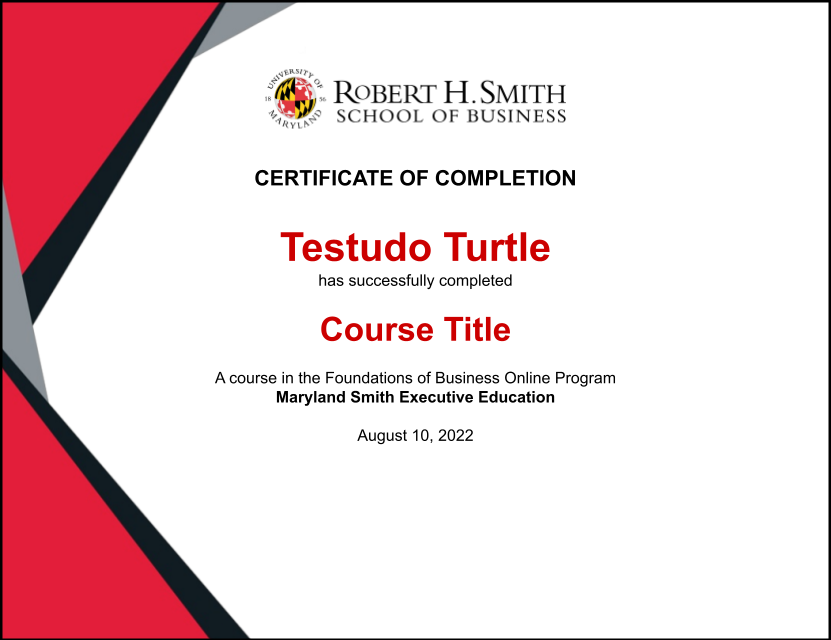Marketing Management
Foundations of Business Online Program
PROGRAM DETAILS
Start Dates: Enroll Immediately
Duration: 30 hours of content
Format: 100% Online
Tuition: $299
Program Description
In this course, you'll learn key marketing strategies to develop products that match customers' needs and create awareness and demand for those products. This is a tough course, but you can do it. We are going to help you. As a faculty team, we have carefully crafted each module to give you the information, practice, and application you'll need. Ultimately, you'll walk away with an understanding of the foundations of marketing.

Why take this course?
This is an asynchronous, self-paced course. That means that you can work at your own speed. There are review questions after most videos and reading. These questions are ungraded and designed for you to check your understanding of the content before moving on.
By the end of this course, you will be able to:
- Evaluate and select the best target segment to devote your time and resources to.
- Explore tactics to create the most value for your target customers.
- Apply the framework to more effectively analyze, strategize, and act on key concepts to build strong relationships with your customers.
Course Topics
Market analysis is important to the marketer because it allows you to devise a comprehensive strategy, so it makes sense to begin the course here.
In the marketing framework for Analysis, there are 5C's (Company, Collaborator, Customer, Competitor, and Context). We will spend a little bit of time here exploring the concept of customer analysis and, specifically, what influences consumer behavior.
This module will equip you to:
- Discuss factors that influence consumer behavior.
- Identify and analyze the three consumer buying processes.
In this module, you'll learn to recognize the three aspects of marketing strategy shown in the figure below: Segment, Target, and Position (STP). You'll practice identifying your position and writing formal position statements so you can clearly and powerfully communicate your strategy. Finally, you will see how customer analysis and strategy concepts come together in a complex, interactive business case.
This module will equip you to:
- Recognize the principles of segmentation, targeting, and positioning.
- List potential target segments for a specific product.
- Practice identifying the components of a positioning statement (drop-down list of positioning parts).
- Craft a positioning statement.
In this module, we explore facets of product decisions, including what it means to deliver a “whole product” to your customer. A whole product is a turn-key solution--everything your customer needs to solve their problem--which can streamline their experience and induce them to buy.
Promotion includes all the activities a firm does to communicate (or promote) its products and services to its target market. These promotional tactics may include a website, television advertising, salesforce, social media, and many others.
A brand is more complicated. It’s how people perceive a firm’s product, service, experience, or organization. It includes the reality of a firm’s offering and the perception that a customer has of that offering. Brands live in a customer’s mind; firms work to influence brands but do not entirely have control over them. Through promotion, firms convey brand identity and meaning to customers.
This module will equip you to:
- Explain the intersection between Strategy and the 4Ps or action steps.
- Describe the three types of value associated with every product.
- Distinguish the benefits of a broad product line and a narrow product line.
- Apply the concept of product value to several real-life companies.
- Demonstrate the ability to craft a positioning statement informed by product considerations.
- Classify the different stages of the consumer buying process at which promotion can be applied.
- Identify the parts of the brand-building framework.
- Analyze how promotion can build your relationship with customers through branding.
In the previous module, we looked at Product and Promotion, now you are ready for the next of the 4P's: Place and Price. We continue exploring the decisions or actions required, specifically around the place or channel through which your product or service is sold.
This module will equip you to:
- Recognize and identify key terminology related to channel management or Place.
- Synthesize information to provide an example of horizontal or vertical conflict in channel distribution.
- Identify and recognize the impact of push or pull strategy.
- Recognize key terms and concepts in Price and value.
- Select and defend the use of a pricing policy.
In the final module, we explore keeping your focus on the customer, or "customer centricity." It is a specific perspective taken to manage the marketing function - instead of being product-centric, you take a customer-centric approach. This holistic viewpoint encompasses the 5C's of Analysis, the STP of Strategy, and the 4P's of Action to develop strategies and tactics to enhance the value provided to the customers and thus increase the value the firms receive in return.
This module will equip you to:
- Describe tactics that can be utilized to increase customer loyalty.
- Explain the concept of customer lifetime value and why it is valuable information for decision-making.
- Explain the role of satisfaction in customer loyalty and commitment.
Format & Structure
The course is completely self-paced. It will take you approximately 30 hours to complete all five modules. Activities include video lessons, readings, and self-reflection activities. Upon completing this course, you will receive a certificate of completion:

This is an asynchronous, self-paced course. That means that you can work at your own speed. There are review questions after most videos and reading. These questions are ungraded and designed for you to check your understanding of the content before moving on.
Smith Faculty

